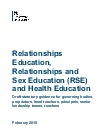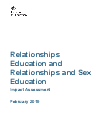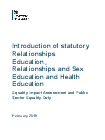Relationships (and Sex) Education and Health Education Consultation Outcome

The new guidance will see children being taught about their mental and physical wellbeing as well as online safety, with content always being age appropriate. Also covered across the curriculum will be LGBT+ issues, respectful relationships and consent.
The new guidance also stipulates that secondary schools should address the physical and emotional damage caused by FGM, raise awareness of the support that is available, and ensure pupils know that FGM is against the law.
The new guidance follows an extensive call for evidence and three-month consultation on the draft regulations and guidance which received over 11,000 responses from charities, teaching unions and more.
Although all schools will teach from the new guidance from 2020, schools who are ready will have the option to deliver the curriculum from September 2019.
Education Secretary Damian Hinds said:
Growing up and adolescence are hard enough, but the internet and social media add new pressures that just weren’t there even one generation ago. So many things about the way people interact have changed, and this new world, seamless between online and offline, can be difficult to navigate. Almost twenty years on from the last time guidance on sex education was updated, there is a lot to catch up on.
Although sex education is only mandatory to teach at secondary, it must be grounded in a firm understanding and valuing of positive relationships, and respect for others, from primary age. In turn positive relationships are connected with good mental health, which itself is linked with physical wellbeing. So it is appropriate to make health education universal alongside relationships and sex education.
I’m very grateful to the many people who have fed into developing these new programmes, to equip youngsters better to deal with the world of today. It starts as it always did with the importance of friendship, kindness, taking turns; as well as learning about the pitfalls and dangers, including on the internet. It will help children learn how to look after themselves, physically and mentally, and the importance of getting away from the screen and the headphones. And it can help young people be resilient as they chart a course through an ever more complex world.
ummary of the key changes:
- LGBT Inclusivity: we have made clearer that teaching about LGBT is expected during pupils’ school years, but schools should decide at what age it is appropriate.
- Right to Withdraw: we have retained the new proposed right but clarified how the decisions of headteachers should take into account SEND and how decisions should be recorded.
- FGM and other forms of abuse: we have included teaching about FGM, forced marriage and rape in secondary schools
- Excessive use of electronic devices/ rationing time online: we have included teaching on the excessive use of electronic devices and rationing time spent online, to protect pupils’ physical and mental health.
- Character and virtues: we have clarified the values and personal traits that will give pupils the character to persevere, manage adversity and make a positive contribution to society.
- Other additions to Health Education: We have included facts about stem cell donation alongside blood and organ donation and clarified that at menstruation and menstrual wellbeing will be taught primary.
Download the full outcome:
Relationships education, relationships and sex education, and health education: government response
Ref: DFE-00053-2019PDF, 534KB, 40 pages
Detail of outcome
Summary of responses we received, along with the government’s response outlining the next steps.
Original consultation
Summary
DfE is seeking views on draft regulations, statutory guidance and a regulatory impact assessment for relationships and sex education and health education.
This consultation ran from to
Consultation description
DfE is proposing that schools are required to teach relationships education at primary school, relationships and sex education at secondary school and health education at all state-funded schools.
The draft regulations and associated statutory guidance build on the findings from the call for evidence and DfE’s engagement with a wide range of expert organisations and interested parties.
The responses to the consultation will help inform any further refining of the draft regulations and statutory guidance before the regulations are put before Parliament and the guidance finally published.
Documents

Updated draft guidance: relationships education, relationships and sex education and health education
PDF, 991KB, 50 pages

Updated impact assessment: relationships education and relationships and sex education
Ref: DFE-00051-2019PDF, 1.2MB, 27 pages

Equality impact assessment: relationships education, relationships and sex education and health education
Ref: DFE-00052-2019PDF, 346KB, 20 pages

Updated draft regulations: relationships education, relationships and sex education and health education
PDF, 486KB, 6 pages
Published 19 July 2018
Last updated 25 February 2019 + show all updates
- Published consultation response and added the equality assessment. Updated the impact assessment, draft legislation and draft guidance.
- First published.











Responses